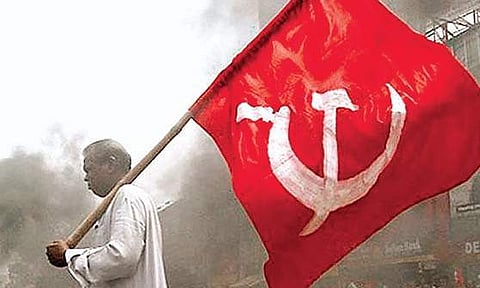

Absence proverbially makes the heart grow fonder. Absence also leads to amnesia. During this vote season of bizarre banter and ideological inanities, a prominent player is missing. Someone who has been historically part of India’s democratic fabric, a significant power bloc, a labour justice giant and a formidable factor in government formation—but hey, where has the Indian Communist gone?
May is a hot month, but one Pinarayi Vijayan doesn’t make a summer. Pundits claim the BJP has hijacked the CPI(M) base in West Bengal, and is cutting into its Kerala vote bank. It is more complicated than that. The reason for any organisation’s irrelevance lies within. History disapproves of the stasis of the soul. Since 2008, the CPI(M) has been more ideologically static than Lenin’s once-ubiquitous cement statues. Toppling the UPA over the 2008 Indo-US nuclear deal was its last hurrah.
The Communists had a long run, and a good one, too. The CPI(M) ruled West Bengal from 1977 when Indira Gandhi dismantled the Emergency to May 2011 when Mamata Banerjee ended its undisputed reign. In Tripura, it won successive elections in 1993, 1998, 2003, 2008 and 2013 until the saffron sweep. The party has had nine chief ministers. But no political outfit can flourish when its primary loyalty is not towards its own country. CPI(M)’s parent was Soviet dictator and mass murderer Joseph Stalin.
The undivided Communist Party of India was founded in Tashkent, then in the USSR on October 17, 1920, following the Second Congress of the Communist International. Subsequently, many Communists did participate in the freedom struggle; however, inspired not by nationalism but by Stalin’s obsession with destroying the British Empire. Fiercely loyal cadres were forged in the fires of revolutions, which imported the liberation of poor farmers and the proletariat from feudal and business exploitation. Then came the famous split in 1964—into the CPI and the CPI(M), with the former owing allegiance to China and the latter to the Soviet Union. Stalin’s ghost still haunts the CPI(M) while the CPI is in ICU. The USSR is no more, and the Communists are the boat people of Indian politics.
The Marxist’s tragedy is that the party will not renounce its Soviet heritage, as seen in Prakash Karat’s Stalin ousting the ideologically moderate and politically realistic Sitaram Yechury’s Trotsky. Its belligerent trade union CITU destroyed state economies, which contributed to its terminal state in Bengal and Kerala. Economics in the end trumps ideology. India has been in the throes of economic change with reform, IT, an aspirational middle class plus Hindutva changing the national order. In Kerala, the CPI(M) exists only as an alternative to the Congress rather than as a credo of protest. Living in cuckoo land and resisting change, Indian Communism has written its own obituary. Comrade Karat is just a guy who likes to play with red ink.
Ravi Shankar
ravi@newindianexpress.com